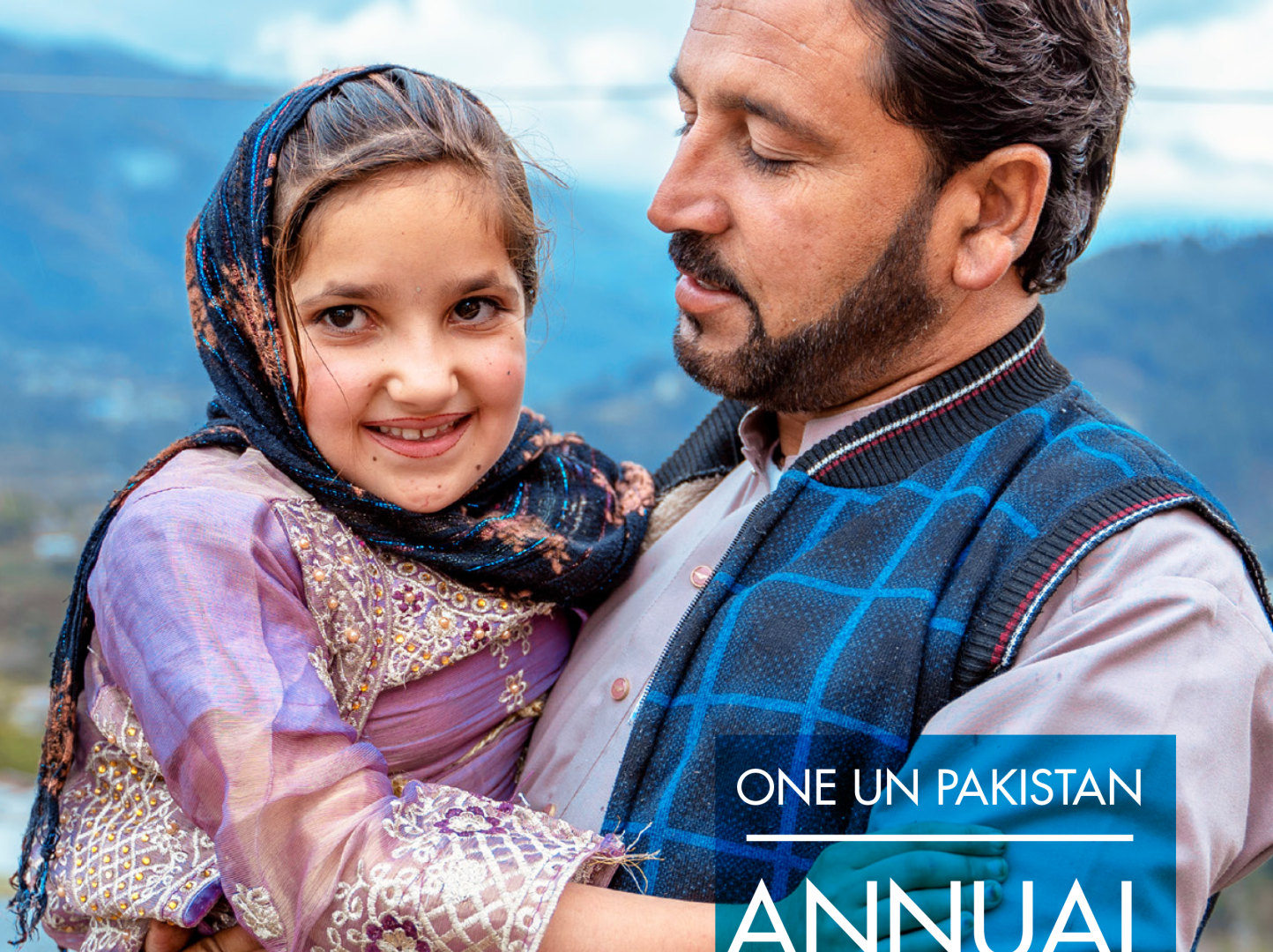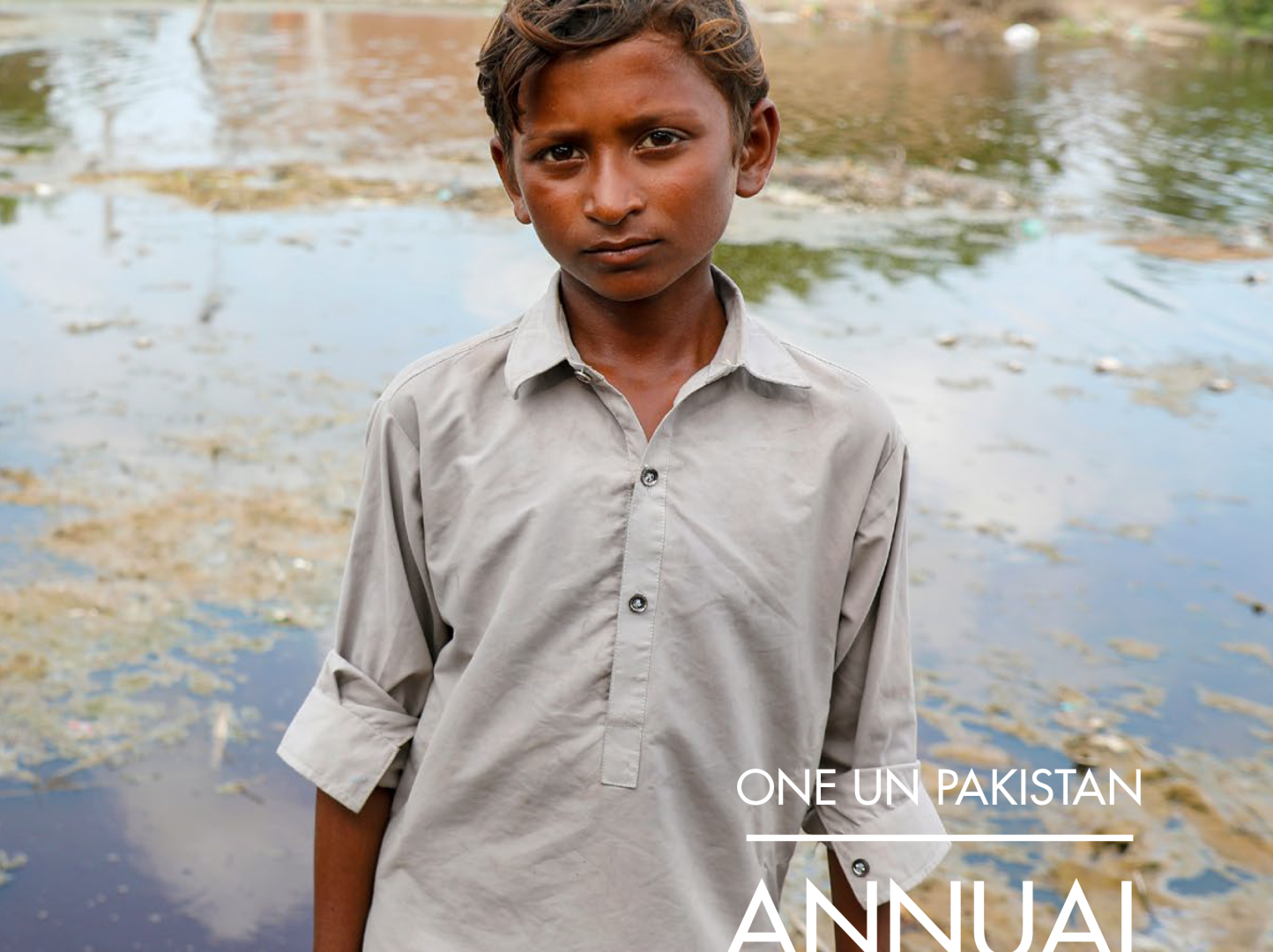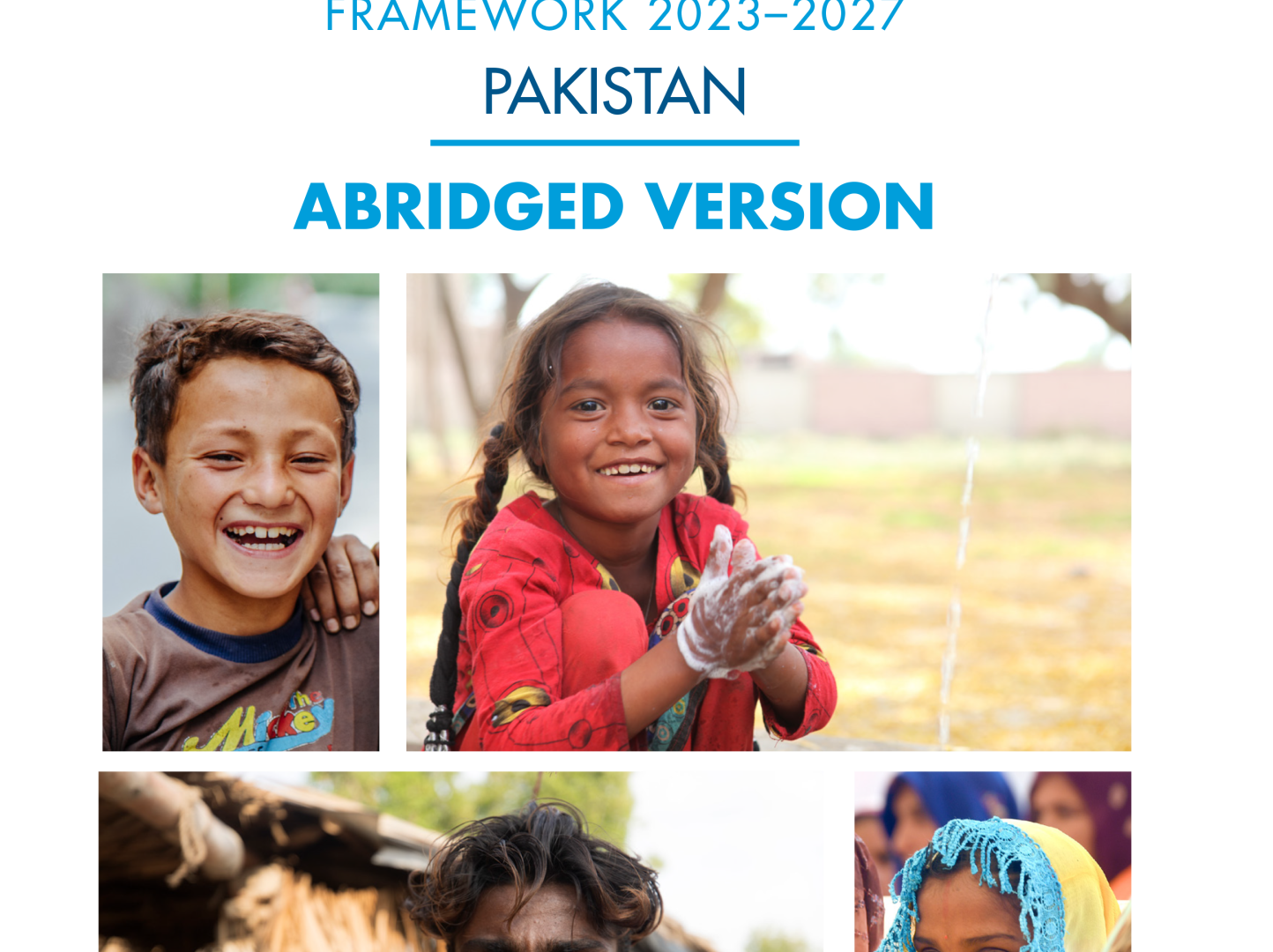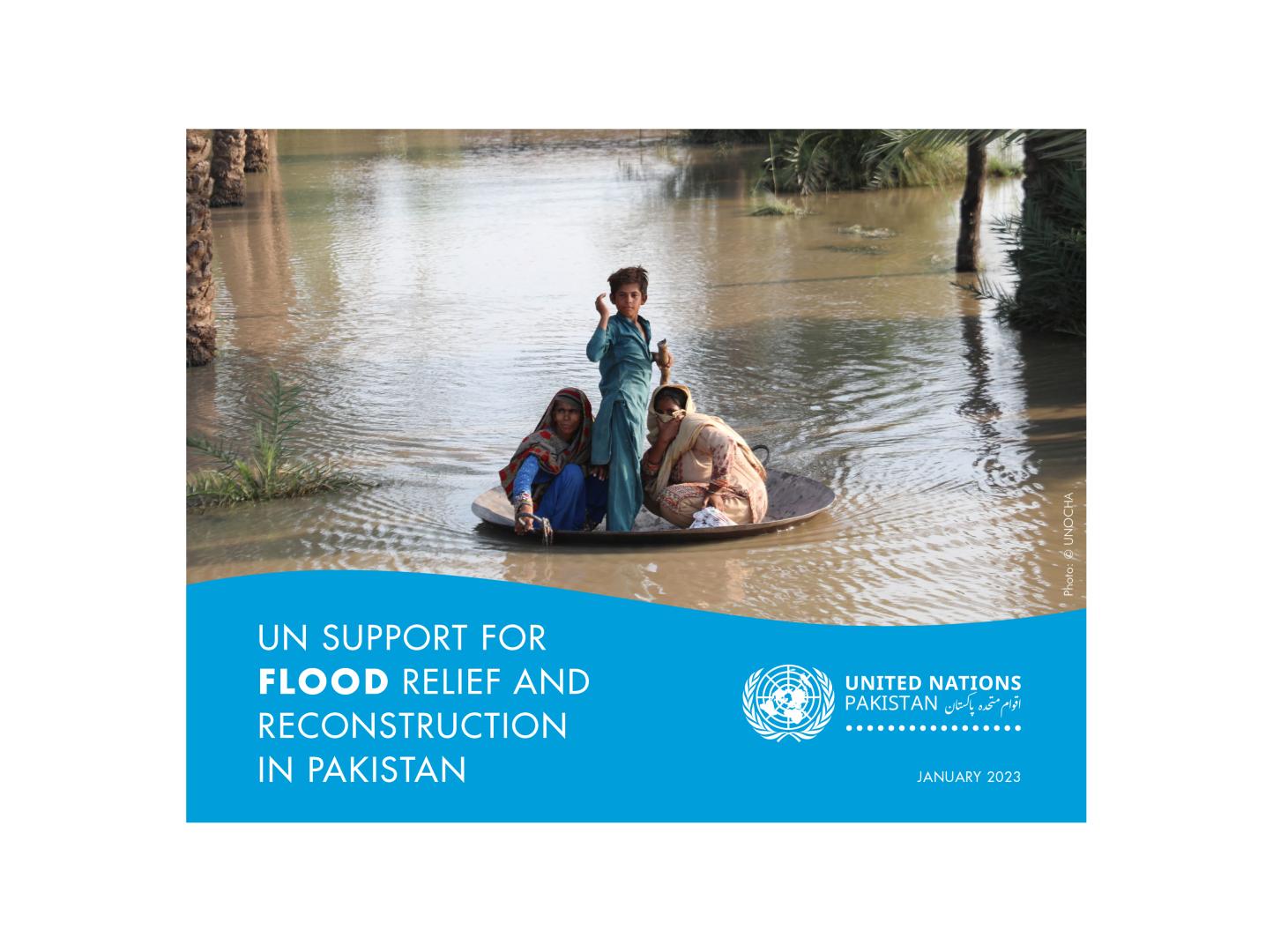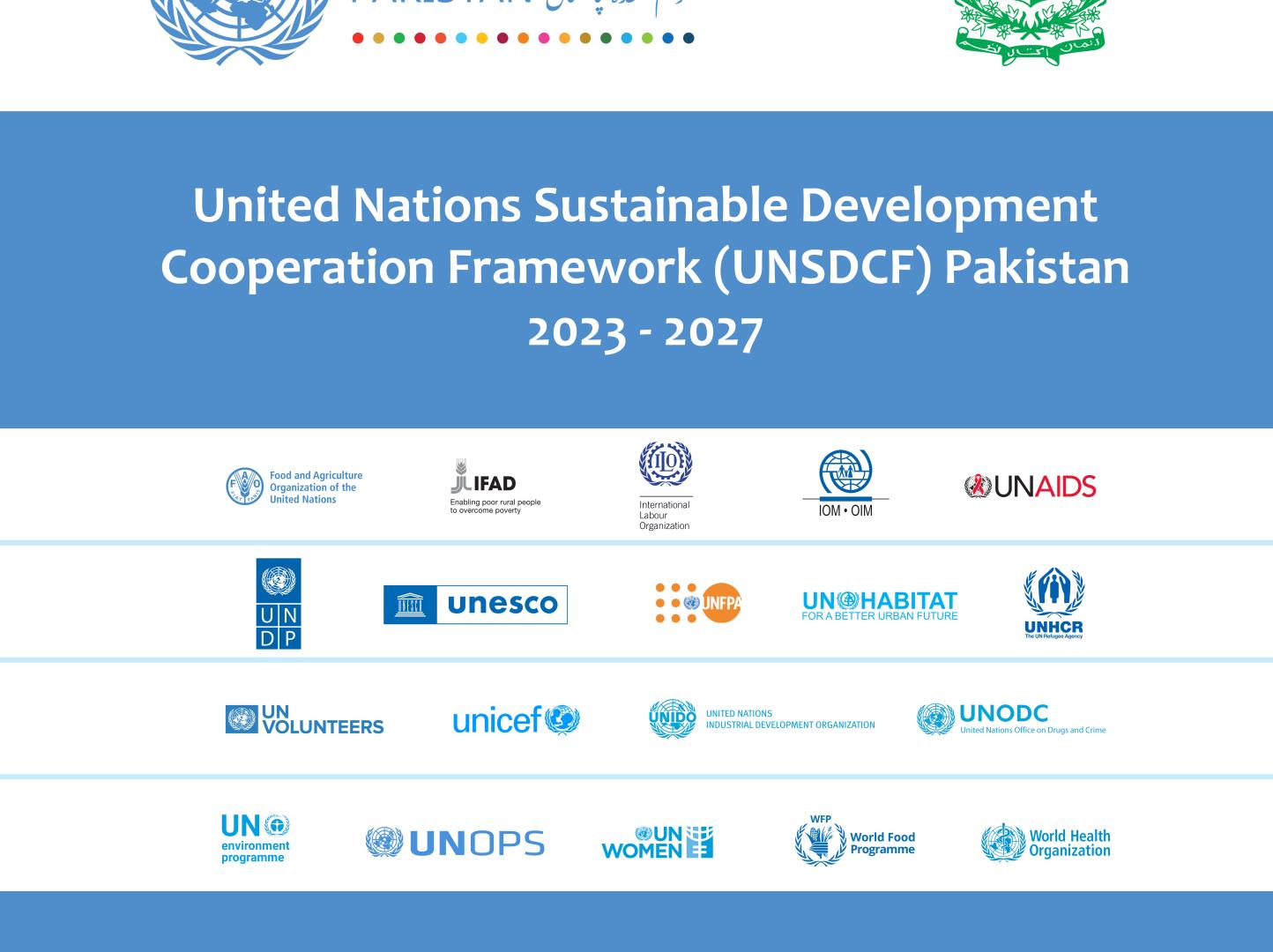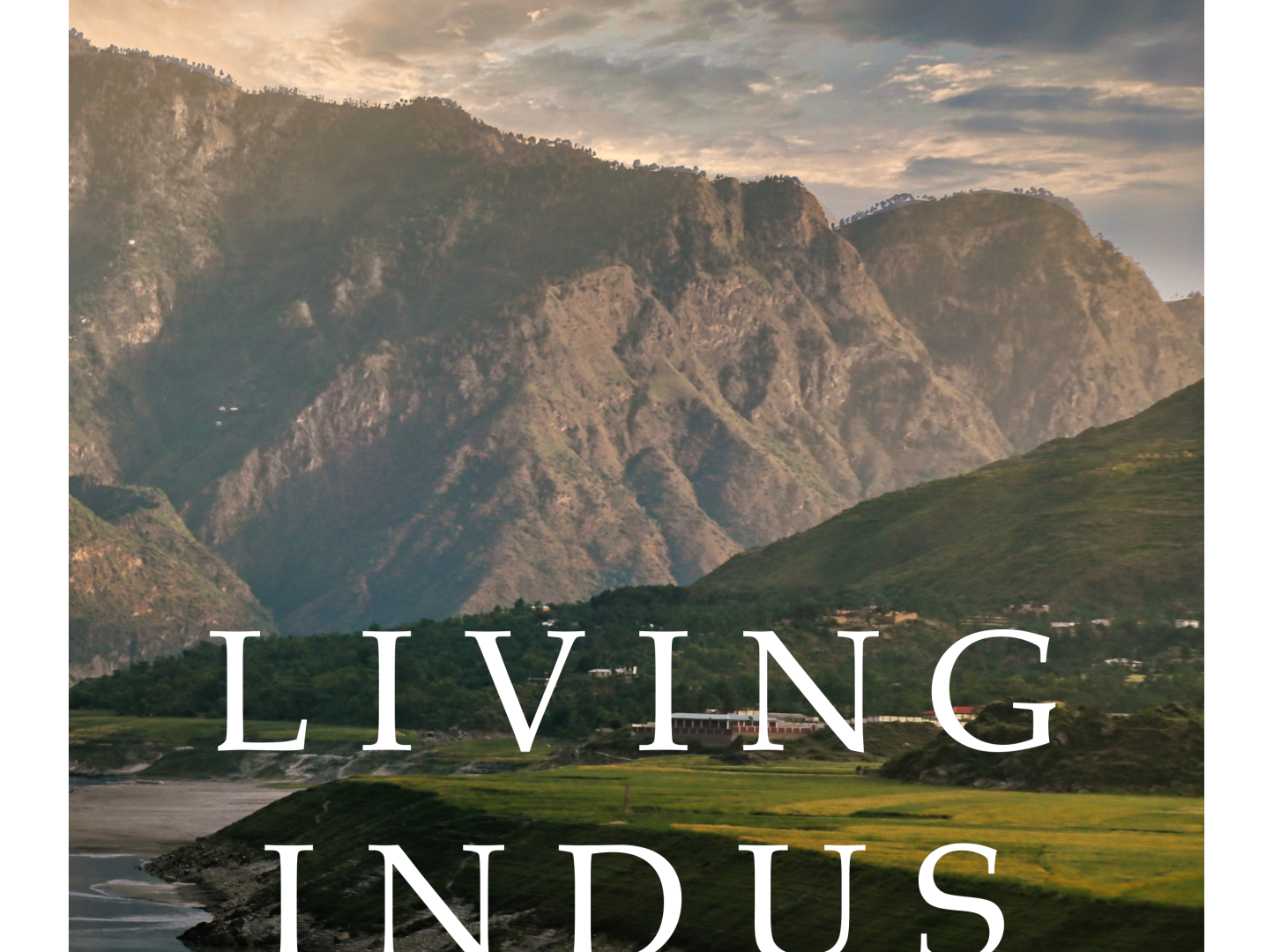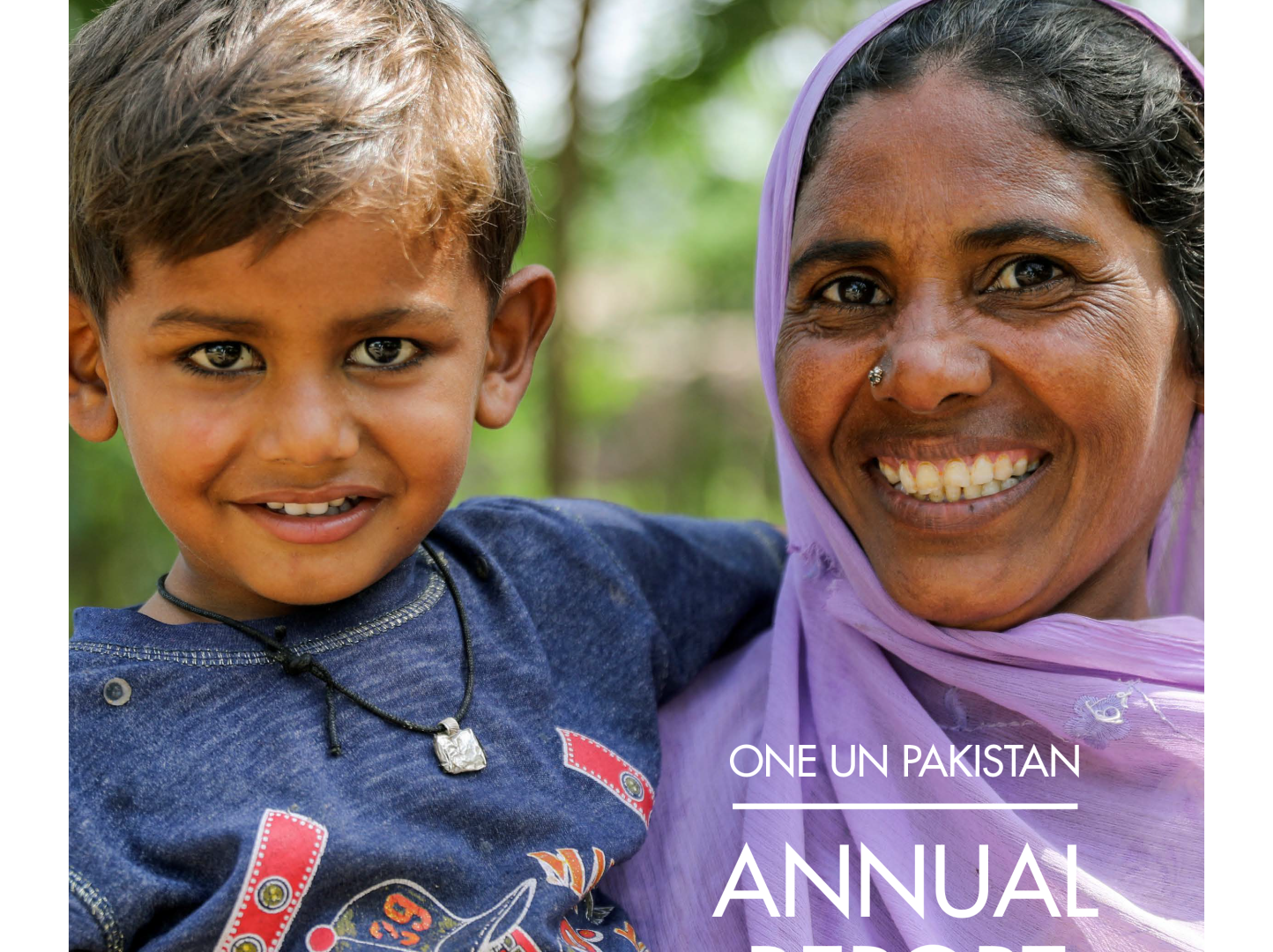Latest
The Sustainable Development Goals in Pakistan
Pakistan affirmed its commitment to the 2030 Agenda for Sustainable Development by adopting the Sustainable Development Goals (SDGs) as its own national development agenda through a unanimous National Assembly Resolution in 2016. Since then, the country has made considerable progress by mainstreaming these goals in national policies and strategies and developing an institutional framework for SDGs implementation in Pakistan. SDG support units have been established at federal and provincial levels with the planning institutions (Ministry of Planning Development and Special Initiatives and Provincial Planning and Development Departments) to guide SDGs implementation and monitoring it progress. In 2018, the Government designed and approved a National SDGs Framework that envisages a national vision to prioritize and localize SDGs. Localized provincial SDG Frameworks are being formulated. The focus of the government is on mainstreaming SDGs in planning processes, ensuring strong monitoring and reporting on SDGs, ensuring public financial allocations are aligned to SDGs and alternate financing modalities are being explored, and to benefit from use of technology to accelerate progress towards SDGs.
Publication
15 April 2025
Annual Report 2024
This annual report is proof positive that development works. It shows how the UN in Pakistan, together with our many partners, changed lives for the better in 2024. In words, numbers and images, this report outlines how our solutions for sustainable development sought to deliver the greatest impact for people in the greatest need.
1 of 5

Publication
15 January 2026
UNCT Pakistan Gender Strategy : 2025 – 2027
The UNCT Gender Strategy is a testament to the UN’s commitment to gender equality, equity and empowerment. It is aligned with the UN’s global mandate while, at the same time, tailored to respond to local needs. It has been developed by the Gender Theme Group (GTG), co-chaired by UNFPA and UN Women, with consultation, collaboration and input from all the UN agencies, funds and programmes working in Pakistan.
1 of 5

Publication
08 November 2022
United Nations Sustainable Development Cooperation Framework (UNSDCF) 2023-2027 for Pakistan
With this framework, the UN in Pakistan has prioritized five development outcomes to improve people’s lives in Pakistan, especially the lives of those at the greatest risk of being left behind. The UN will support Pakistan to move forward on its pathway towards sustainable development, on the understanding that:✓ If basic social services – including health, nutrition, water, sanitation and hygiene (WASH), education and social protection – are strengthened, there will be increased equal access to sustainable quality services for all.✓ If women, girls and transgender persons are empowered to reach their fullest potential, their human, social, economic and cultural rights will be fully protected and upheld, and they will have decision-making power over all aspects of their lives.✓ If the health of the Indus River Basin is restored and protected, and resources are equitably and efficiently used, the Indus will sustain a thriving civilization from its sources to the sea, and Pakistan will be much better equipped to adapt to climate change and mitigate its impact.✓ If there is sustainable and inclusive green economic growth and decent work, there will be equitable employment opportunities, enhanced productivity, a sustainable business environment and the realization of workers’ rights.✓ If inclusive, accountable and efficient governance systems are in place, they will provide equitable service delivery, affordable and accessible justice systems, and enable people to be aware of – and obtain – their rights.To download an abridged version: Click here
1 of 5
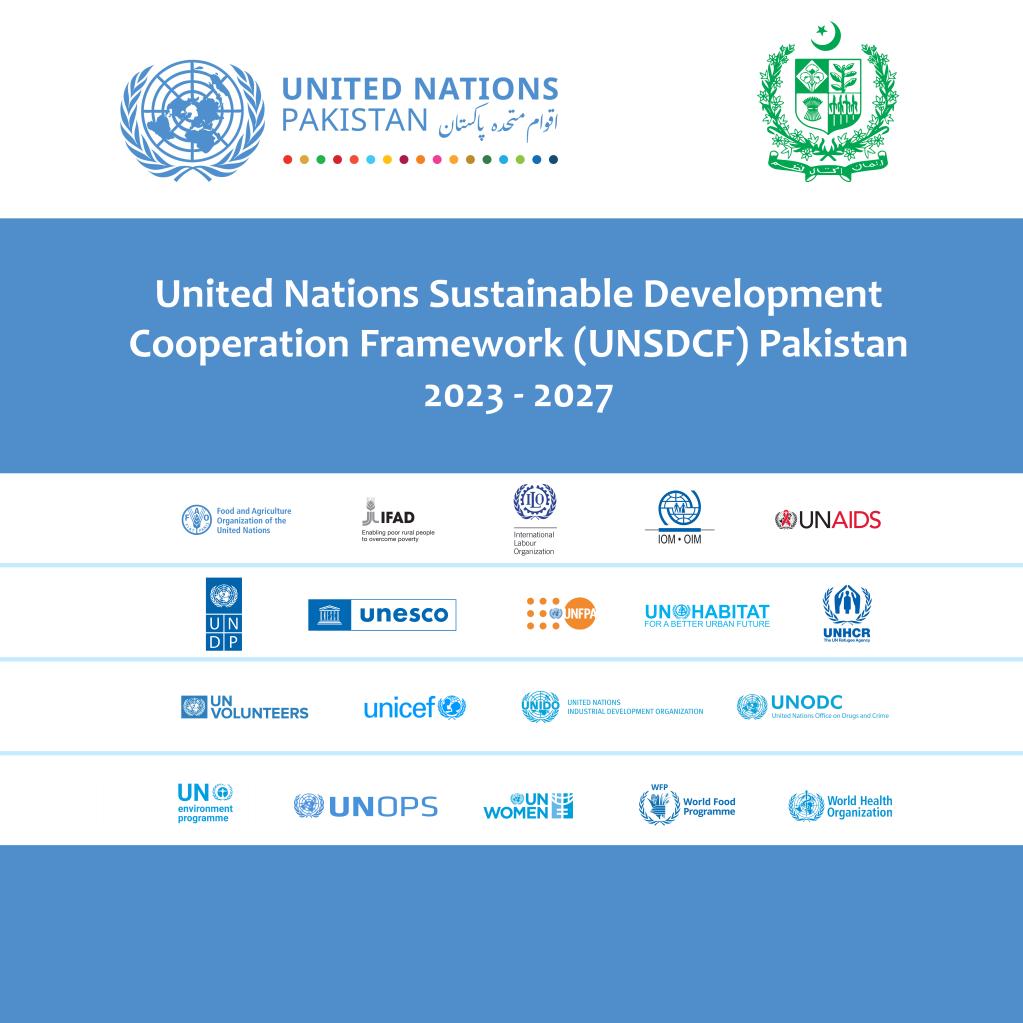
Publication
19 March 2025
CCA 2024 Update: CLIMATE FINANCING AND POLICY RECOMMENDATIONS
The UN Common Country Analysis (CCA) 2024 Update provides a comprehensive examination of Pakistan’s climate financing needs, challenges, and opportunities. With climate change posing an existential threat, the report highlights a staggering $348 billion financing gap required for mitigation and adaptation efforts by 2030.Despite being among the top 10 countries most vulnerable to climate change, Pakistan lags behind in international climate finance accessibility, with domestic private sector contributions remaining particularly low. The report identifies key barriers, including limited institutional capacity, slow disbursement rates, and reliance on debt-based climate finance, which further strain the country’s economic resilience.To address these gaps, the policy brief outlines strategic recommendations such as:· Developing a mid-term climate financing strategy,· Expanding domestic and international financing sources,· Enhancing governance frameworks, and· Strengthening disaster risk financing mechanisms.With climate inaction costs projected to reach $1.2 trillion by 2050, urgent and coordinated efforts are required from policymakers, financial institutions, and development partners to drive Pakistan’s transition toward sustainable and climate-resilient growth.
1 of 5
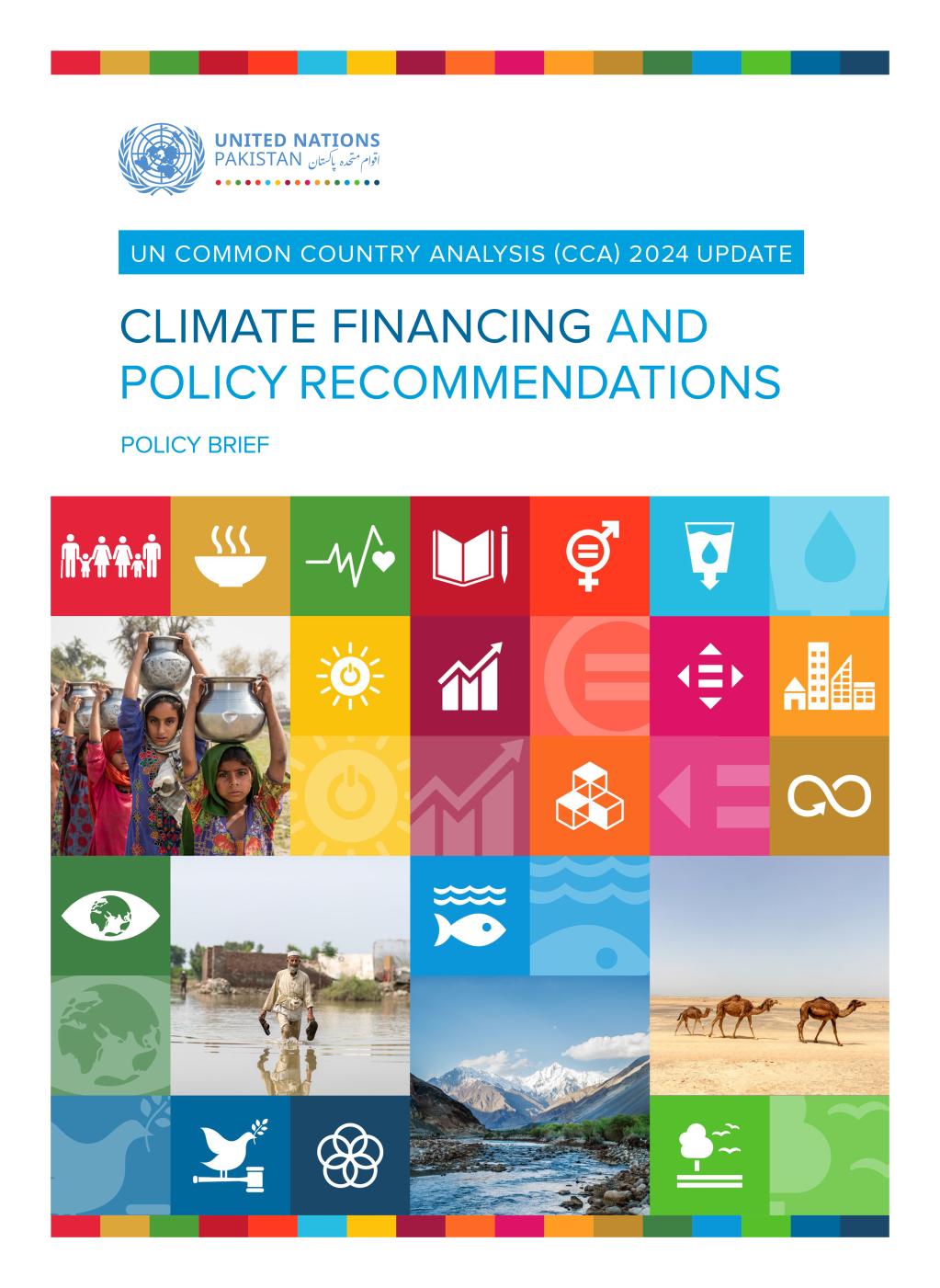
Publication
19 March 2025
Tax Compliance: Rationale and Behavioral Aspects of Taxpayer Motives (Zheng Hian and Shah Muhammad Azhar)
The objective of this policy brief is to provide an easy-to-digest overview of the factors affecting tax compliance in developing countries, including taxpayer motives at the micro level (Section II) and determinants of national tax capacities at the macro level (Section III), as well as a summary of policy options based on the discussion (Section IV). Section V describes the tax situation in Pakistan and discusses the main messages and insights of the policy brief for Pakistan.
1 of 5
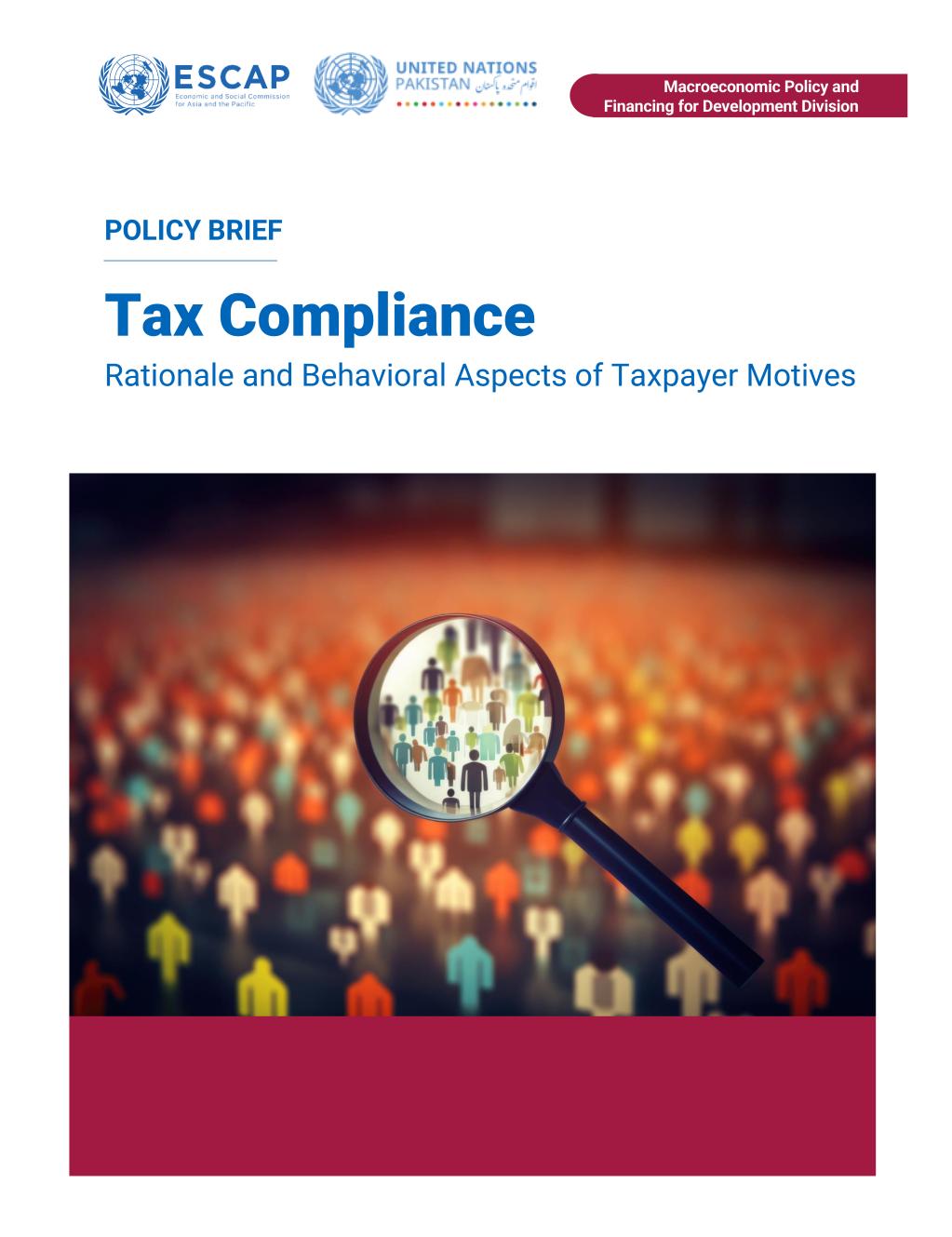
Story
20 February 2026
Health on wheels for flood-affected communities in Pakistan
19 February 2026, Islamabad/Lahore – “They didn’t just bring medicine; they brought the hospital to our doorstep,” says Haider, a local farmer from Jhook Dargai village. He is one of the 250 000 people affected by the 2025 monsoon floods in Punjab who have been prioritized by the World Health Organization (WHO) to receive essential health services, as part of the response funded by the UN Central Emergency Response Fund (CERF).Haider and his family were visited by a doctor in one of the mobile health units deployed by WHO in collaboration with the Alkhidmat Health Foundation (AKHF) and the District Government of Jhang. The intervention was designed specifically to bridge the gap for hard-to-reach communities with significant mobility and financial barriers – with particular attention to women, children, persons with disabilities, and the elderly.For farmers like Haider, the medical camps brought new hope. “The floods took our crops and our savings. When my wife, Sakina, and our little daughter, Fatima, began showing signs of extreme fatigue and weakness, I didn’t know where to turn. The local health facilities were inaccessible, and we had no money for transport or private clinics.”The mobile health teams performed rapid blood testing for Haider and his family – services normally unavailable in such remote areas. The tests revealed that both Sakina and Fatima were suffering from severe anaemia, a common consequence of the emergency triggered by the floods. They were immediately provided with medical counselling and essential medications, free of charge.By providing maternal, newborn, and child health services, ultrasound diagnostics, and rapid testing at no cost, the mobile units have helped ease the financial hardship of families already pushed to the brink by the 2025 climate-driven floods.The impact of the camp extended far beyond clinical treatment. Haider was among more than 300 community members, including students and local volunteers, who participated in intensive awareness-raising sessions. These sessions, supported by WHO Pakistan, utilized information, education, and communication materials to empower the communities with knowledge on epidemic prevention and the management of nutritional deficiencies. “The volunteers visited our homes and schools, teaching us how to protect ourselves from waterborne diseases,” says Haider.Medical camp supported by WHO for people affected by the 2025 floods in Punjab, Pakistan. Photo credit: WHO PakistanThe network of AKHF volunteers remains active in the village, meticulously visiting households to ensure that vital health counselling and life-saving information take root.A patient receives prescribed medicines after being checked up in a WHO-supported mobile health unit. Photo credit: WHO PakistanIn villages like Jhook Dargai, the partnership between WHO, CERF, Pakistan and AKHF has contributed to improving public health and restoring dignity.CERF early financing enabled Pakistan’s health sector to rapidly provide essential services following the 2025 floods, supporting timely life-saving interventions for displaced and vulnerable populations across the most severely affected districts of Punjab.The beneficiaries of WHO interventions supported by CERF are much more than numbers. They are mothers, daughters, sons, grandparents, and fathers like Haider.Haider’s family is no longer “unreachable”, proving that, even in the wake of a climate catastrophe, the power of health partnerships can bring hope for all – regardless of economic status, where they live or who they are.
1 of 5

Story
13 February 2026
Mobilizing 400,000 WHO-trained polio workers to vaccinate 45 million children in Pakistan
“We climb mountains and walk through the snow for hours with great difficulty. There is also a risk of snow falling on us from the mountains. Yet we do not give up. We reach our assigned area to vaccinate all children and protect them from polio,” says Rabia, a polio worker from Upper Chitral, Khyber Pakhtunkhwa.Rabia is one of the 400,000 polio frontline workers trained and mobilized by the World Health Organization (WHO), in partnership with Pakistan’s Polio Eradication Initiative, who went door-to-door during the first national polio vaccination campaign of 2026 (2–8 February). Their goal: to bring the life-saving polio vaccine to 45 million children.Over the past 3 decades, thanks to hundreds of thousands of polio workers and the unwavering commitment of the Government of Pakistan and partners, Pakistan has reduced polio cases by 99.8% – from an estimated 20,000 in the early 1990s to 31 cases in 2025. Experts agree: ending wild polio in Pakistan and worldwide is within reach, but only if all partners intensify the response, particularly in the remaining two endemic countries: Pakistan and Afghanistan.Polio worker Rabia (right) in Upper Chitral during the national campaign conducted in Pakistan from 2-8 February 2026. Photo credit: WHO PakistanThe WHO-prequalified polio vaccines are safe and effective and have been used in 195 countries to fight polio and shield millions of children from a disease that has no cure and can cause lifelong paralysis or death.During the recent February campaign, Rabia climbed steep mountains in remote areas to visit 146 houses and vaccinate 85 children.Like Rabia, Momina is part of a 2-member polio team in Booni, Upper Chitral. “I thank Allah that I have gotten this opportunity to serve and I am trying my best to eradicate polio in my country,” she says. About 400 kilometres away, Zeenat was deployed in the Khayaban-e-Sir Syed area, Rawalpindi. She spent her days walking for hours, traversing narrow alleys and climbing multiple floors of buildings to visit 242 houses and administer 2 drops of the oral polio vaccine to every child.“I am a mother too and I have also gotten my own children vaccinated for polio. Thank God, they are healthy and protected now,” she says. “This disease has no cure. I want all parents in the country to vaccinate their children with polio drops so they don’t fall prey to paralysis.”A WHO staff member and a vaccinator mark children’s fingers after administering polio drops in Rawalpindi, Pakistan, during the first 2026 national polio campaign (2-8 February). Photo credit: Hamid Inam/WHO Pakistan.A science-based polio operation to fight a global threatAs a founding partner of the Global Polio Eradication Initiative (GPEI), WHO provides technical and operational assistance to Pakistan’s Polio Eradication Initiative, launched in 1994. In this role, WHO supports Pakistan and partners in leading key components of the largest polio operation in the world. This includes science- and evidence-based vaccination campaigns, training and deployment of polio workers, outbreak response, poliovirus surveillance and monitoring and evaluation of vaccination drives. In 2024–25, WHO polio operations in Pakistan were supported by the generous contributions of Pakistan, United Arab Emirates, United Kingdom of Great Britain and Northern Ireland, France, Canada, Kingdom of Saudi Arabia, Germany, United States of America, the Gates Foundation and Rotary International.Carrying hope, two polio drops at a time“The vaccine is very important for children in Pakistan because polio can infect children and paralyze them. This is why we go house-to-house to vaccinate them so that no child is paralyzed,” says Neelum, a polio worker from Rawalpindi.Rabia, Momina, Zeenat, and Neelum’s dedication is a testament to the work of hundreds of thousands of polio workers who make their way across the country to keep families and communities safe from the global health threat of polio. On every street corner, on every snowy slope, in every remote desert, and at every river crossing – two drops at a time – they carry the hope of a healthier, polio-free future for all. Written by: Suzanna MasihEdited by: Dr José Ignacio Martín Galán
1 of 5

Story
09 January 2026
Against the odds: Pakistan's health heroes protecting girls from cervical cancer
Riffat, Saira, Shaheen, and Naheed are 4 of the 49 000 health workers trained with support from the World Health Organization (WHO) who implemented Pakistan's first-ever human papillomavirus (HPV) vaccination campaign to prevent cervical cancer in 2025, protecting over 9.6 million girls aged 9–14 years.As we mark cervical cancer awareness month, we celebrate their stories and their crucial contributions to the fight against a preventable disease that every year affects over 5000 women in Pakistan – killing 3200 of them (64%).By battling a disinformation storm to protect millions of girls and their future families, these frontline workers achieved a historic milestone in the nation’s public health journey. They became the heroes paving the way towards ending cervical cancer for millions of women.Riffat Naz: the planner who rewrote the planRiffat Naz, UCMO using the community map to discuss with her team members the number of girls to be vaccinated in each area and school. Photo credit: Ayesha Javed/ WHO Pakistan"Every single girl on our list is a daughter, a sister, a future leader. Our planning must be flawless to protect every one of them,” sayd Riffat Naz, a Union Council Medical Officer (UCMO) in Islamabad before the campaign began. Her team spent months conducting meticulous microplanning, creating maps and data sheets for a campaign largely focused on schools.However, reality quickly tested these plans. Riffat’s teams faced unexpected reluctance from school administrations and a high number of parents who, influenced by online misinformation, refused to provide consent. When school-based coverage remained significantly low, Riffat had to change the approach. Her new strategy focused on reaching girls outside the classroom, redeploying teams to reassure parents at their doorstep and covering out-of-school girls in communities and nomadic settlements. “Our initial plans were challenged daily, but with the support of government authorities we were able to adapt”.Saira Hassan: the social mobilizer on the frontline of misinformationSaira responds to mothers' questions during a community engagement session. Photo credit: WHO PakistanAs the campaign shifted from schools to households, the role of social mobilizers like Saira Hassan became even more critical. Her task was to counter misinformation circulating online by answering questions from parents and providing science-based facts to show that the WHO-prequalified vaccine is safe, life-saving, and effective, and has been successfully used in 150 countries – including Muslim countries – to protect girls from cervical cancer.“When I speak to a mother, I tell her this vaccine is safe and free, and is for the health of her daughter,” says Saira. With 7 years of experience, she used the trust built in her community to patiently counter the myths. This personal commitment was mirrored by staff at WHO, who vaccinated their own daughters and shared these moments on social media, creating a powerful, unified front against misinformation.Shaheen Akhter and Naheed Akhter: a team reassuring parents amidst doubtHealth workers Naheed and Shaheen during a training facilitated by WHO Pakistan. Photo credit: Hamid Inam/WHO Pakistan.For vaccinator Shaheen Akhter, being part of this historic first campaign was an honor. The intensive training supported by WHO had prepared her for the job. But the real test came in the field, where she and her team assistant, Naheed Akhter, faced parents filled with fear and doubt.While Shaheen focused on the vaccine, Naheed provided reassurance to parents and girls. “My job is to make sure everyone feels safe and cared for. A kind word and a smile can make all the difference,” Naheed says. Her reassuring presence was vital in calming anxious families. “I see my own daughters in the faces of these young girls,” she says.A new conversation, a ray of hopeTogether, Riffat, Saira, Shaheen, and Naheed represent the thousands of health workers who made the first vaccination campaign in Pakistan to prevent cervical cancer possible. While the 66% coverage rate achieved indicates that there is still work to be done, a ray of hope has emerged from the challenges. The campaign’s frontline workers have ignited a nationwide conversation on ending the public health threat of cervical cancer for millions of girls. Written by: Ayesha Javed - WHO Pakistan Edited by: José Ignacio Martín Galán - WHO Pakistan
1 of 5

Story
24 April 2025
Laila’s journey: crossing rivers and fields to vaccinate every child
“Children should complete their vaccinations, no matter where they live. To reach these locations, we travel on foot, often crossing fields. Sometimes we use a boat to cross rivers to ensure that no child misses a vaccination.” In the scorching heat of Ghazi Kot – a remote area of Muzaffargarh district – navigating the waters of the Indus River in a small boat, 24-year-old Laila Ashiq embarks with her vaccine carrier on a heroic mission to vaccinate every child and pregnant woman against preventable diseases, leaving no one behind. As one of only 12 female vaccinators in the district, Laila's commitment to her community of 60 000 individuals goes beyond her role as vaccinator for the Expanded Programme on Immunization (EPI) in Pakistan, a collaborative initiative supported by the World Health Organization (WHO). “When children are vaccinated, they stay healthy, contributing to a healthier society and helping to brighten the future of Pakistan,” says Laila. Laila, who lost her mother in 2021 and supports her 2 younger sisters while her father works as a ticket collector, embodies resilience and determination. Twice a week, Laila travels 25–30 km along a treacherous river route to reach hard-to-access villages. Driven by her unwavering belief that every life matters, Laila vaccinates women and children and educates mothers on the importance of regular vaccination and preventive care, helping to ensure that their children grow up healthy. "Vaccination is not just a choice, it's a responsibility that we share for the well-being of the children of our community. Through outreach and awareness-raising efforts, vaccinators transform indifference into a commitment to protect our children from preventable diseases like tetanus and measles”, says Laila. Laila vaccinates children against 12 fatal diseases including childhood tuberculosis, polio, diarrhoea, pneumonia, diphtheria, pertussis (whooping cough), tetanus, haemophilus influenzae type b, meningitis, typhoid, measles and rubella. “I felt relieved after the completion of the vaccination course for my son, knowing my child is protected now. For this I am grateful to Laila who not only informed me about the benefits of vaccination but also ensured I stayed on track with each dose,” said Rabia Bibi, mother of 3 children and a resident of Daddoo Mor village in Ghazikot.Laila’s dedication to outreach activities in geographically challenging regions is a testament to her commitment to improving health care services in the community. For her, having access to vaccinations is not a privilege, but a human right. “I believe that health is a fundamental right for every child, and this right cannot be taken away from them. Their vaccinations should be completed, no matter where they live.”
1 of 5

Story
24 April 2025
Pakistan: the women heroes of polio eradication
From vaccination campaigns to disease surveillance, women are at the forefront of the fight against polio across Pakistan, defying challenges, overcoming social norms, building trust and protecting the most vulnerable children from this lifelong paralytic disease. They are leading the way to run the last mile and end the global threat of polio.They are people like Ayesha Raza, a polio survivor who earned global recognition in 2024 for her dedication to fight this deadly disease, Bakht Roza and Basmina – who reach nomadic children in the harsh terrain of southern Khyber Pakhtunkhwa – and Dr Sarwat Wajahat Sheikh, whose efforts were recently recognized by the Government of Sindh. Ayesha, the polio survivor protecting Pakistani children from disability “It’s not easy for me to walk during polio campaigns due to my limited mobility, but I cannot miss the chance to bring hope and resilience to the children of Pakistan.”Polio eradication is a personal mission for Ayesha Raza, a Pakistani polio survivor and health worker whose remarkable commitment earned her global recognition at the Golden Jubilee Ceremony of the Islamic Development Bank – a polio eradication donor – which took place in Saudi Arabia in 2024.Every year, Ayesha is one of 400 000 vaccinators who go door-to-door to implement massive Government-led vaccination campaigns, supported by the World Health Organization (WHO) and partners, to protect over 45 million children against paralytic polio in Pakistan. Ayesha was 2 years old when she contracted polio in the 1990s, at a time when Pakistan did not have a dedicated polio programme. Since then, vaccinators like Ayesha have reduced the number of polio cases by 99.7%. With her left leg paralyzed and difficulty walking, Ayesha’s childhood was challenging. But she refused to let disability define her. She turned to a career as a health worker and also volunteered for the Pakistan Polio Eradication Programme.Ayesha works as a vaccinator and social mobilizer in Lahore, convincing hesitant parents to vaccinate their children to protect them from lifelong disability. “I eagerly await the day when polio is completely eradicated, bringing a brighter future for our nation and the world,” she says.Brave women on motorbikes to reach nomad children In the rough mountainous terrain of Lakki Marwat, two brave Pashtun women, Bakht Roza and Basmina navigate remote, security-compromised areas on motorbikes to vaccinate children against 12 deadly diseases, including polio. Working in Bettani subdivision, where health services are scarce, they are the sole source of essential immunization for children and expectant mothers.Deployed under the Nomads Vaccination Initiative – launched in 2022 to vaccinate nomadic children who often miss polio and routine vaccinations due to frequent movement – Bakht Roza and Basmina travel long distances and overcome cultural barriers to protect children from terrible diseases. They have vaccinated nearly 2800 children, convinced over 200 refusal families to accept immunization, and administered tetanus vaccinations for pregnant women who had not received vaccinations at the local health facility because only a male vaccinator was available. Braving harsh terrain, falls from bikes and community resistance, they remain steadfast. “We think of all the children in the community who need our help as our own children and that motivates us to keep going,” says Bakht Roza.Their story is a testament to the resilience and dedication of female vaccinators who ensure that every child has the chance for a healthy future. WHO Disease Surveillance Officer Recognized for Breakthrough Case Detection “As a public health worker, a polio-free Pakistan is my highest priority and a dream to realize.”Making Pakistan polio-free is a priority for Dr Sarwat Wajahat Sheikh, a WHO Disease Surveillance Officer in Karachi’s Malir district. Her hard work and exceptional commitment to identifying and investigating polio cases in her district was recognized by the Government of Sindh on World Polio Day 2024. In 2017, Dr Sarwat joined WHO in Sindh’s Dadu district where she played a key role in strengthening poliovirus and vaccine-preventable disease surveillance. In 2021, she was transferred to Karachi where the dense population, frequent migration and pockets of vaccine resistance, especially in underserved communities, make poliovirus circulation a persistent challenge. In Karachi Dr Sarwat contributed to expanding the number of surveillance sites from 43 to 93 and mobilized 152 community informants to improve polio case detection. In 2024, she faced one of her toughest cases in Ibrahim Hyderi, a slum community of labourers and fishermen, where a child – suspected of having polio – had unfortunately passed away. The family was hesitant to cooperate with the Pakistan Polio Programme’s case investigation teams. Undeterred, Dr Sarwat spent weeks building trust with the parents, ultimately convincing them to let the teams collect stool samples from other children in the family to rule out polio. Her efforts led to confirmation of the first polio case in the area in 10 years, triggering an urgent vaccination response to protect all children in the community. Dr Sarwat’s work earned her special recognition from the Government of Sindh. “Disease surveillance is a powerful tool to level the playing field, to bend the arc of our country away from poliovirus and towards a polio-free Pakistan”.
1 of 5

Press Release
23 February 2026
Media Update: United Nations Pakistan, 21 February 2026
Second National Judicial Educators Conference advances judicial excellence in PakistanIslamabad, 20 February 2026 – The Federal Judicial Academy (FJA), through funding provided by the European Union and in partnership with the United Nations Development Programme (UNDP) under the Deliver Justice Project, convened the second annual National Judicial Educators Conference in Islamabad, bringing together 45 judicial educators from across the country.The two-day conference focused on accelerating the implementation of the Islamabad Declaration on the Future of Judicial Excellence, unanimously adopted at last year’s conference in October. The Declaration set out a shared vision for strengthening judicial education, emphasized the need for a National Judicial Education Framework, and proposed the establishment of a National Judicial Educators Forum to encourage collaboration and continuous learning.In the closing ceremony, Mr. Hayat Ali Shah, Director General, Federal Judicial Academy, expressed appreciation for the active engagement and insightful contributions of all participants. He remarked, “This Conference has not only reinforced our shared commitment to judicial excellence but has also provided a dynamic platform for knowledge exchange and collaboration among judicial educators from across Pakistan. The discussions and action plans developed over these two days will be pivotal in developing a unified curriculum and advancing the Islamabad Declaration on the Future of Judicial Excellence. I am confident that the establishment of the National Judicial Educators Forum will sustain this momentum and ensure that judicial education continues to meet the highest standards of quality, inclusivity, and relevance.”Throughout the conference, provincial and national judicial educators participated in interactive group exercises aimed at improving the training of judges and court staff. The discussions emphasized reforms in curriculum design and pedagogical approaches within judicial academies nationwide, with a focus on improving the justice sector's responsiveness to the evolving needs of communities.Speaking on the occasion, Ms. ?na Kelly, First Secretary, Rule of Law, European Union Delegation to Pakistan, highlighted, “Judicial academies are a key part of a stable, modern and informed judiciary. Through the capacity building of judges and their legal staff, the academies lead the way in sharing case and procedural knowledge and best practice. The Federal and Provincial Judicial Academies of Pakistan, therefore, are a core part and partners of our justice sector support to Pakistan now and for the future.”The two-day conference concluded with the development of a comprehensive action plan to implement the Islamabad Declaration on the Future of Judicial Excellence, aimed at modernizing judicial training practices and strengthening institutions responsible for delivering justice.Ms. Shahzada Ahmad, Programme Manager, Rule of Law Programme, UNDP Pakistan, emphasized, “We have made significant achievements in strengthening the institutional capacity of judicial academies in Pakistan. This forum and the successful implementation of last year’s Declaration will further advance this transformation that has people-centered justice at its heart.” She also thanked the FJA, provincial judicial academies, high courts, and the EU for their partnership in advancing the rule of law through the Deliver Justice Project.###Contact Details: For additional information, please contact:Fizza Bangash, Communications Analyst, UNDP Pakistan, fizza.bangash@undp.org or +92 (51) 835 5631Samar Saeed Akhtar, Communication, Press and Information Officer at The European Union Delegation to Pakistan, samar-saeed.akhtar@eeas.europa.eu About the Deliver Justice Project:The 20 Million Euro “Deliver Justice Programme”, is funded by the European Union and aims to support reform processes to ensure the delivery of people-centered justice, enhance access to justice for all, particularly women and less privileged groups, and improve service delivery of the security sector in line with constitutional safeguards and international standards in Khyber Pakhtunkhwa including the Merged Districts and Balochistan. The programme is funded by the EU and jointly implemented by the United Nations Development Programme (UNDP), the United Nations Entity for Gender Equality and the Empowerment of Women (UN Women), and the United Nations Office on Drugs and Crime (UNODC).The UNDP Rule of Law Programme is implementing a range of interventions to enhance security and justice sector governance in Pakistan.About UNDP:UNDP is the leading United Nations organization fighting to end the injustice of poverty, inequality, and climate change. Working with our broad network of experts and partners in 170 countries, we help nations to build integrated, lasting solutions for people and planet.Learn more at undp.org
1 of 5
Press Release
20 February 2026
Media Update: United Nations Pakistan, 18 February 2026
UNHCR, Peshawar Zalmi call for empathy towards refugees, asylum-seekers UNHCR and Peshawar Zalmi have renewed their long-standing partnership, reiterating their call for greater compassion towards refugees and asylum-seekers.ISLAMABAD, 17 February 2026: UNHCR, the UN Refugee Agency, and Peshawar Zalmi have reaffirmed their collaboration to promote empathy, dignity and solidarity for displaced communities.Since 2016, UNHCR and Peshawar Zalmi have worked together on initiatives supporting refugees. As a leading franchise of the Pakistan Super League, the team has harnessed the unifying power of sport to amplify refugee voices and share their stories with broader audiences.Through this partnership, Peshawar Zalmi has highlighted that refugees are not defined by hardship, but by their resilience, talent and potential.A partnership announcement ceremony was held on Tuesday 17th February 2026, in Islamabad, attended by Ms. Philippa Candler, UNHCR Representative in Pakistan, and Mr. Mian Abbas Layaq, Chief Operating Officer of Peshawar Zalmi.Speaking at the event, Ms. Candler said UNHCR is proud to continue its collaboration with Peshawar Zalmi, whose consistent support has helped elevate refugee voices across Pakistan and beyond.“This is not just a logo on a jersey — it is a badge of humanity, worn with pride by champions on and off the field,” she said.She added that together, they are demonstrating that refugees are not forgotten — they are part of “our team, our stories, and our future.”Delivering a message on behalf of Javed Afridi, Chairman of Peshawar Zalmi Foundation, Mr. Layaq emphasized the importance of empathy and dignity.“Refugees share the same hopes and ambitions as anyone else. Their circumstances call for empathy and dignity,” he said.“Cricket has the power to connect people across boundaries. Through our ongoing collaboration with UNHCR, we want to highlight the resilience and contributions of refugees. We are honoured to use our platform to foster understanding, solidarity and support for displaced families,” he added. Media contactMr. Qaiser Khan Afridi, UNHCR Pakistan Spokesperson, +92-300-5018696
1 of 5
Press Release
20 February 2026
Media Update-2: United Nations Pakistan, 19 February 2026
Pakistan Advances National Strategy against Organized Crime Islamabad 18 February 2026 - Key national and international stakeholders convened in Islamabad on 16–17 February for the Multistakeholder Consultative Workshop on shaping Pakistan’s National Strategy against Organized Crime, marking an important step toward finalizing the country’s first comprehensive framework to address organized criminal networks.The two-day workshop supported by the United Kingdom, facilitated by the United Nations Office on Drugs and Crime (UNODC) in collaboration with the Government of Pakistan brought together approximately 60 participants from federal and provincial authorities, law enforcement agencies, civil society organizations, and development partners.Opening the proceedings, UNODC Country Representative Troels Vester highlighted the evolving and multidimensional nature of organized crime, stressing that effective responses must move beyond isolated institutional efforts toward a coordinated whole-of-society approach.Representing the Ministry of Interior, Joint Secretary Shahzad Hameed Khan Durrani reaffirmed the Government of Pakistan’s commitment to endorsing and implementing the National Organized Crime Strategy. He underscored the need for strengthened investigative capacity, intelligence sharing, gender-responsive approaches, and sustained inter-agency coordination.The Director General of the Federal Investigation Agency (FIA) emphasized the Agency’s frontline role in combating transnational and technology-driven crimes, including irregular migration, human smuggling, cybercrime, and money laundering. He noted that the emerging strategy must translate into operational results through improved investigations, prosecutions, and institutional capacity-building.Mr. Alasdair Grant, Counsellor for Security and Justice at the British High Commission emphasized that the UK is proud to support Pakistan’s National Strategy Against Organised Crime. He stressed how this was an important milestone in strengthening coordination, promoting evidence‑based action, and upholding the rule of law. Working alongside the Government of Pakistan and UNODC, we are helping to protect communities and reinforce our shared effort to reduce transnational organized crime.During the workshop, participants reviewed and refined activities under the four strategic pillars of Prevent, Pursue, Protect and Promote, while identifying implementation, monitoring, and evaluation mechanisms to ensure sustainability.A significant milestone was the presentation of the Civil Society Declaration, which reinforced the importance of community engagement, accountability, and victim protection within the national response framework.The consultative process reflects Pakistan’s growing commitment to an inclusive, evidence-based and coordinated approach to tackling organized crime. The next phase will focus on finalization and operationalization of the National Strategy.For more information contact: Ms. Rizwana Rahool (rizwana.rahool@un.org - cell: +923018564255)
1 of 5
Press Release
20 February 2026
Media Update: United Nations Pakistan, 19 February 2026
Government of Sindh and the United States Department of Agriculture Announce $80 Million for Sindh’s School Meals ProgramKARACHI, Pakistan (February 17, 2026) —The Government of Sindh and the United States Department of Agriculture’s McGovern-Dole International Food for Education and Child Nutrition Program today launched the Sindh School Meals Program, which leverages U.S.-provided commodities to deliver daily cooked meals and take-home rations to more than 200,000 students across nearly 1,300 primary schools in Sindh.With a USD $80 million funding from the U.S. Department of Agriculture (USDA), the initiative will be implemented by Save the Children and the World Food Programme (WFP), in coordination with Sindh’s Planning and Development Department, School Education and Literacy Department, and provincial Food and Health departments, contributing to improved enrolment, attendance, and foundational learning.The Sindh School Meals Program represents one of the largest regional investments in school nutrition to date and a major step forward in strengthening school nutrition and education outcomes in the province. By resolving nutritional deficiencies worsened by recent floods and economic downturns, this program will keep children in school and help them perform well academically.To ensure lasting impact and institutional ownership, the program includes significant investments in capacity strengthening at both school and district levels. Thousands of teachers, headteachers, School Management Committee members, and district officials will be trained in food safety, nutrition education, and monitoring. This is complemented by the rehabilitation of Water, Sanitation, and Hygiene (WASH) facilities in targeted schools, ensuring students’ access to a clean and safe environment for food consumption."The United States is proud that our farmers and agricultural producers can support the children of Pakistan by providing quality wheat, pulses, and cooking oil for school meals to feed over 250,000 school children in the next six years," said Charles Goodman, U.S. Consul General in Karachi. "The McGovern-Dole Food for Education Program represents true partnership for shared prosperity. A winning plan for children, for farmers in both our countries, and for the relationship between Pakistan and the United States."The Sindh Minister for Education, Syed Sardar Ali Shah, said “This initiative is a milestone in tackling malnutrition and boosting school attendance, laying a strong foundation for a brighter future for children in Sindh through the integration of education and nutrition. I appreciate the support of the U.S. Government, the World Food Programme, and Save the Children, and I am confident that together we will create lasting change for generations to come.”He said that malnutrition is widespread among children in underprivileged areas, which adversely affects the learning process. Through this program, not only will children’s health improve, but it will also help bring out-of-school children back into schools.Muhammad Khuram Gondal, Country Director, Save the Children Pakistan reiterated that “For children in Pakistan, hunger stands in the way of learning. This initiative represents a powerful commitment to ensuring that children in Sindh can attend school regularly, concentrate in class, and grow up healthy.” He explained how, with support from the USDA McGovern-Dole Program, Save the Children together with the Government of Sindh and partners, “is working to create schools where children are nourished, protected, and supported to reach a bright and promising future.”“In Pakistan, where 25 million children are out of school, school meals are a proven multisectoral game changer – providing healthy, nutritious meals, keeping children in school, and improving their ability to learn,” said Coco Ushiyama, World Food Programme Country Director and Representative in Pakistan. “WFP is proud to support the Government of Sindh, with USDA, in building a school feeding system that will ensure every child has the opportunity to learn, grow, and reach their full potential.”To ensure the highest standards of transparency and provincial ownership, implementation will be overseen by a Joint Steering Committee comprising senior representatives from the Government of Sindh, WFP, Save the Children, and other national partners. Together, these efforts will help ensure that fortified U.S. wheat, vegetable oil, and pulses traveling from American farms—complemented by the local and regional procurement of fresh fruits and vegetables from Sindh’s own growers—reach schools across the province, delivering the nutrition students need to learn, grow, and thrive. By incorporating produce sourced from local farmers, the initiative not only strengthens school nutrition but also supports livelihoods and contributes to a more resilient provincial economyAbout the McGovern-Dole Program:The USDA McGovern-Dole International Food for Education and Child Nutrition Program helps support education, child development and food security in low-income, food-deficit countries around the globe. The program purchases nutritious packaged U.S. agricultural commodities from American farmers, ranchers, and producers, to support school feeding and maternal and child nutrition projects. The statutory objectives of the McGovern-Dole Program are to reduce hunger and improve literacy and primary education, especially for girls. By providing school meals and teacher training, McGovern-Dole projects help boost school enrollment and academic performance. For more information, visit https://www.fas.usda.gov/programs/mcgovern-dole-food-education-programAbout World Food Programme: The World Food Programme is the world’s largest humanitarian organization saving lives in emergencies and using food assistance to build a pathway to peace, stability and prosperity, for people recovering from conflict, disasters and the impact of climate change.About Save the Children: Save the Children has been working in Pakistan since 1979 and has reached at least 14 million beneficiaries, including children, through programs in health and nutrition, education, child protection, livelihoods and through our humanitarian response programs. حکومتِ سندھ اور امریکی محکمۂ زراعت کا سندھ کے 1,300 اسکولوں میں مفت خوراک اور راشن کے لیے 80 ملین ڈالر کے منصوبے کا اعلان کیا۔ کراچی — ۱۷ فروری ۲۰۲٦ — حکومتِ سندھ اور امریکی محکمۂ زراعت (یو ایس ڈی اے) کے مئکگورن-ڈول انٹرنیشنل فوڈ فارایجوکیشن اینڈ چائلڈ نیوٹریشن پروگرام نے آج سندھ اسکول میلز پروگرام کا آغاز کیا ہے، جس کے تحت امریکی فراہم کردہ اشیائے خورونوش کے ذریعے سندھ بھر کے تقریباً 1,300 پرائمری اسکولوں میں 200,000 سے زائد طلبہ کو روزانہ تازہ تیارشدہ مفت کھانا اور گھر لے جانے کے لیے راشن دیا جائے گا۔امریکی محکمۂ زراعت کی جانب سے 80 ملین امریکی ڈالر کی مالی معاونت کے ساتھ یہ پروگرام سیو دی چلڈرن اور ورلڈ فوڈ پروگرام (WFP) کے زیرِ انتظام صوبہ سندھ کے پلاننگ اینڈ ڈیولپمنٹ ڈیپارٹمنٹ، اسکول ایجوکیشن اینڈ لٹریسی ڈیپارٹمنٹ اور فوڈ و ہیلتھ ڈیپارٹمنٹس کے تعاون سے چلایا جائے گا۔ اس کا مقصد بچوں کی حاضری، داخلہ اورابتدائی تعلیمی صلاحیتوں میں بہتری لانا ہے۔اسکولوں میں کھانوں کی فراہمی کا یہ منصوبہ اب تک علاقائی سطح پر غذائیت و تعلیم میں سب سے بڑی سرمایہ کاری میں سے ایک ہے اور سندھ میں غذائیت اور تعلیمی نتائج کو مزید موثر بنانے کی جانب اہم قدم ہے۔ حالیہ سیلابوں اور اقتصادی مشکلات کے باعث بچوں میں غذائی کمی بڑھی ہے، اور یہ منصوبہ ان کی اسکول میں حاضری کو یقینی بنانے اورانکے تعلیمی نتائج بہتر بنانے میں اہم کردار ادا کرے گا۔اس پروگرام کے موثر و پائیدار نتائج کو یقینی بنانے اوراسکی ادارتی سطح پر قبولیت کے حصول کے لیئے اسکولوں اور ضلعی سطح پرعملہ کی تربیت اوراستعداد بڑھانے میں بھی نمایاں سرمایہ کاری کی جائے گی۔ ہزاروں کی تعداد میں اساتذہ، پرنسپلز، سکول مینجمنٹ کمیٹی کے اراکین اور ضلعی افسران کو فوڈ سیفٹی، غذائیت، اور مانیٹرنگ کی تربیت دی جائے گی۔ ساتھ ہی منتخب اسکولوں میں واٹر، سینی ٹیشن اور ہائجین (واش) کے بنیادی سہولیات کی بحالی بھی ممکن بنائی جائے گی، تاکہ بچوں کو صاف اور محفوظ ماحول میں کھانا فراہم کیا جا سکے۔اس موقعہ پر بات کرتے ہوئے کراچی میں تعینات امریکی قونصل جنرل چارلس گڈمن نے کہا، "ہمیں فخرہے کہ امریکی کسان اور زرعی پیداوار فراہم کندہ پاکستان کے بچوں کی مدد کر رہے ہیں، اور معیاری گندم، دالیں اور خوردنی تیل فراہم کر کے اگلے چھ سالوں میں 2 لاکھ 50 ہزار سے زائد طلبہ و طالبات کو کھانا اور راشن مہیا کریں گے۔" انھوں نے مزید کہا ہے کہ، "مئکگورن-ڈول فوڈ فارایجوکیشن پروگرام مشترکہ خوشحالی کے لیئے حقیقی شراکت داری کی علامت ہے۔ یہ بچوں، دونوں ممالک کے کسانوں، اور پاکستان و امریکہ کے تعلقات کو مزید مستحکم بنانے کے لیئے ایک اہم پیشرفت ہے۔"وزیرِ تعلیم سندھ نے بھی اس بات سے اتفاق کرتے ہوئے کہا، "تعلیم قوموں کی ترقی کا بنیادی ستون ہے، اور یہ شراکت داری ہر بچے کو سندھ میں صحتمند اور روشن مستقبل دینے کے عہد کو پورا کرتی ہے۔"سیو دی چلڈرن پاکستان کے کنٹری ڈائریکٹر محمد خرم گوندل نے کہا، "پاکستان میں 'بھوک' بچوں کی تعلیم کے حصول میں سب سے بڑی رکاوٹ ہے۔ یہ قدم اس بات کا پختہ عزم ہے کہ سندھ کے بچے باقاعدگی سے اسکول آئیں، کلاس میں توجہ دیں اور صحتمند انداز سے آگے بڑھیں۔" انہوں نے مزید کہا کہ، "USDA مئکگورن-ڈول پروگرام کے تعاون سے سیو دی چلڈرن، حکومتِ سندھ اور شراکتدار اسکولوں کو اس قابل بنانے کے لیئے پر عزم ہیں، تا کہ بچے غذائیت سے بھرپور، محفوظ اور معاون ماحول میں تعلیم حاصل سکیں اور روشن مستقبل کیجانب گامزن ہوں ۔"ورلڈ فوڈ پروگرام پاکستان کے کنٹری ڈائریکٹر اور نمائندہ کوکواوشئییما نے کہا، "پاکستان میں تقریباً 2 کروڑ 50 لاکھ بچے اسکولوں سے باہر ہیں۔ اسکولوں میں خوراک فراہم کرنے کے ایسے منصوبے بچوں کی تعلیم میں جامع تبدیلی لانے کے ثابت شدہ اقدام ہیں — یہ صحتمند غذائیں فراہم کرتے ہیں، حاضری یقینی بناتے ہیں، اور سیکھنے کی صلاحیت کو بہتر کرتے ہیں۔" انہوں نے مزید کہا کہ WFP حکومتِ سندھ کے ساتھ USDA کے اشتراک سے ایک اسکول فیڈنگ سسٹم کی بنیاد رکھنے پر فخر محسوس کرتا ہے جو ہر بچے کو سیکھنے، آگے بڑھنے اور اپنی مکمل صلاحیت تک پہنچنے کا موقع فراہم کرے گا۔اعلیٰ سطح پر شفافیت کو یقینی بنانے اور صوبائی سطح پر اس منصوبے کو اپنانے کے لیئے، اس پروگرام کے نفاذ کی نگرانی ایک مشترکہ سٹیرنگ کمیٹی کرے گی، جس میں حکومتِ سندھ، ڈبلیو ایف پی، سیو دی چلڈرن اور دیگر قومی شراکتدار شامل ہوں گے۔ ان سب کی مشترکہ کوششوں سے یہ یقینی بنایا جائے گا کہ امریکی گندم، خوردنی تیل اور دالیں — جو امریکا کے کھیتوں سے درآمد کیجائیں — اور اسکے ساتھ سندھ کے مقامی وعلاقائی کسانوں سے تازہ پھل و سبزیاں جوکہ مقامی منڈیوں سے خریدی جائین — انکی اسکولوں تک رسائی کویقینی بنایا جاسکے، جس سے طلبہ کو مطلوبہ خوراک و غذائیت ملے— جس سے نہ فقط مقامی کسانوں کو بلکہ صوبائی معیشت کو بھی استحکام ملے۔ مئکگورن-ڈول پروگرام کا تعارف:امریکی محکمۂ زراعت (USDA) کا مئکگورن-ڈول بین الاقوامی پروگرام برائے تعلیم و غذائیت بچوں کی تعلیم، نشوونما اورغذائی تحفظ میں کم آمدنی اور غذائی قلت والے ممالک کی مدد کرتا ہے۔ یہ پروگرام امریکی کسانوں، مویشی پالنے والوں اور زرعی مصنوعات تیار کرنے والوں سے غذائیت سے بھرپور ڈبہ بند زرعی اجناس خرید کر اسکولوں میں خوراک اور والدین و بچوں کی غذائیت کے منصوبوں کی معاونت کرتا ہے۔ مئکگورن-ڈول پروگرام کے طے شدہ قانونی اہداف میں بھوک کم کرنا اور خصوصاً لڑکیوں کی خواندگی و ابتدائی تعلیم میں بہتری لانا شامل ہے۔ اسکولوں میں خوراک کی فراہمی اور اساتذہ کی تربیت کے ذریعے، مئکگورن-ڈول کے منصوبے اسکولوں میں داخلے اور تعلیمی کارکردگی بڑھانے میں مددگار ثابت ہوتے ہیں۔
1 of 5
Press Release
20 February 2026
Media Update: United Nations Pakistan, 17 February 2026
Pakistan steps up efforts to extend labour and social protection to informal workersA national forum highlights collective efforts to support workers in the informal economy and strengthen labour and social protection through social dialogue.ISLAMABAD (ILO News) – More than 80 per cent of workers in Pakistan are employed in the informal economy — with limited rights, protection and social security. Representatives of government, employers’ and workers’ organizations reaffirmed their commitment to advancing the transition to formal and protected work at a national tripartite forum convened by the International Labour Organization (ILO) under the Promoting Rights and Social Inclusion through Organization and Formalization (PRS) Phase 2 Project.The forum brought together over 300 participants to review progress in extending labour and social protection to workers in sectors with high levels of informality — including domestic work, sanitation and the plastic value chain — and to identify priorities for scaling up sustainable interventions. Participants emphasized that strengthening institutions, expanding social dialogue and improving access to protection mechanisms are essential to improving working conditions and ensuring decent work.Geir Tonstol, Country Director, ILO Pakistan emphasized that “No single entity can tackle informality alone, tripartite collaboration is key. When governments, employers, and workers work together, awareness rises, practices improve, and institutions strengthen, ensuring that progress is sustainable.”Through the project, partners supported measures to extend labour and social protection to domestic workers in Punjab, including the notification of a minimum wage and simplified access to social security registration. These steps support implementation of the Punjab Domestic Workers’ Act and bring domestic workers closer to formal recognition and protection.The initiative also strengthened social dialogue mechanisms by supporting collaboration between the Department of Labour, the Punjab Employees’ Social Security Institution and employers’ and workers’ organizations. As a result, new unions were established in the sanitation and plastic value chain sectors, while domestic workers’ organizations across several districts came together to form the first provincial Domestic Workers Federation in Punjab.More than 10,000 domestic and sanitation workers were mobilized and registered in unions, strengthening their voice and representation. Union council committees were established at community level to support dispute resolution for domestic workers. With project support, the Lahore Waste Management Company (LWMC) extended social security coverage to over 18,000 waste management workers, alongside improved occupational safety and health measures, including provision of personal protective equipment, paid maternity leave and workplace health services.Tauseef Dilshad Khattana, Additional Secretary, Department of Labour, Punjab, noted the Government’s commitment to facilitating workers’ transition to formality, adding that initiatives such as digital wallet accounts for low-income households aim to enhance financial inclusion and strengthen accountability in employment relationships.Heejin Ahn, Regional Project Coordinator of the PRS Project stated that “While informality is complex and multifaceted, our collective achievements through the project demonstrate that when policies, institutions and systems work together, we can unlock pathways to formalization for workers, enhancing their visibility, dignity and livelihoods.”For further information please contact:Muhammad NumanCommunication OfficerEmail: numan@ilo.orgMobile: +92 303 5000041 Related Content Promoting rights and social inclusion through organization and formalization (PRS) – Phase 2: Pakistan Component
1 of 5
Latest Resources
1 / 11
Resources
08 November 2022
1 / 11

























